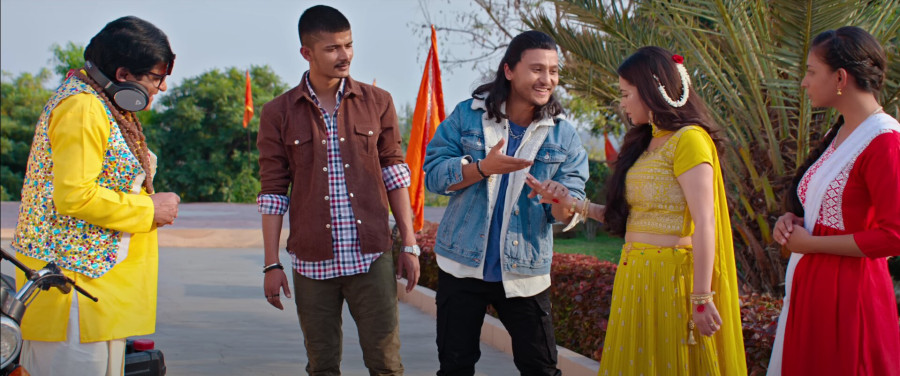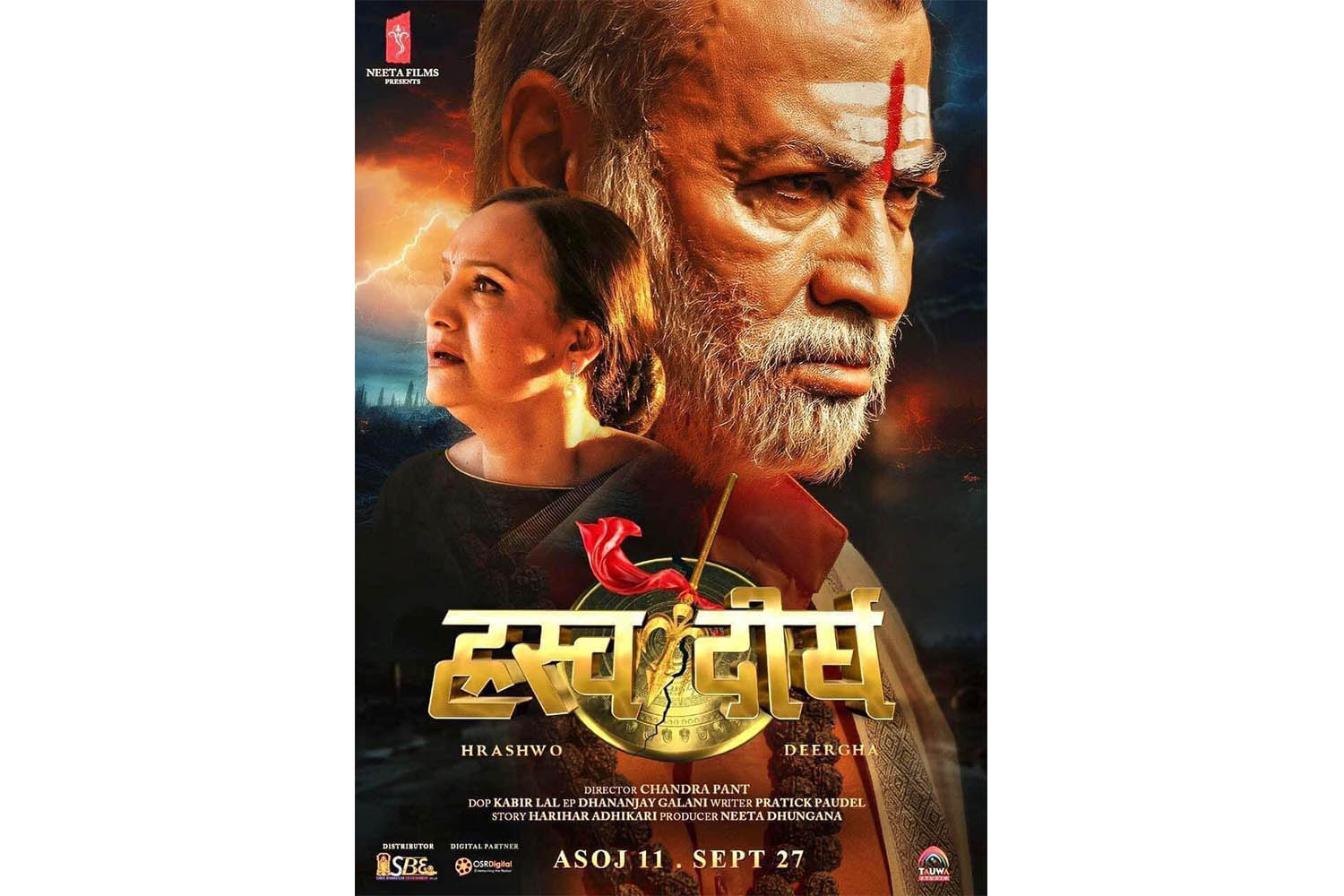Movies
Another missed opportunity in Nepali filmmaking
‘Hrashwo Deergha’ boasts a strong cast but is undermined by illogical plot twists and excessive VFX.
Sanskriti Pokharel
Whenever life felt dull, I’d watch Brahmanandam’s funny South Indian movies to relax. So, as a fan, I couldn’t miss his role in the new Nepali movie ‘Hrashwo Deergha’.
With a substantial ensemble of talented Indian actors, lavish set designs, stunning lighting, and elegant costumes, the movie, directed by Chandra Pant, has become the talk of the town. Falling under the action-comedy-romance genre, the romantic storyline overshadows the other two aspects. While Brahmanandam's presence adds charm to the movie, his limited screen time underwhelms the comedic element.
In its exposition, the movie attempts to illustrate the two distinct worlds of the lead characters: Narayani (Neeta Dhungana) and Hari (Harihar Adhikari).
Narayani is portrayed as the daughter of renowned Indian actor Pradeep Ram Singh Rawat, who plays the role of Mahamant. She resides in Devadham, which is depicted as a hub of religious and spiritual significance. Growing up in such an environment, Narayani embodies a conformist nature. Her life revolves around discipline, deeply rooted in traditions, values, and ideals.
In contrast, Hari is the son of the mayor of Bharatpur, played by Bipana Thapa. His upbringing, shaped by the privileges of his position, leads to a more materialistic outlook on life, starkly different from Narayani’s.
The film’s title metaphorically represents their opposite cultural and familial backgrounds and personalities.
The main plot revolves almost entirely around the blossoming romance between Narayani and Hari, and it kicks off in a somewhat serendipitous way. Their first encounter occurs during a ritual at Devadham, where a twist of fate brings them together. A man selling Fevicol accidentally drops his box, sending the glue bottles rolling toward Narayani. Just as one bottle is about to hit her, Hari rushes forward to protect her. In a surprising turn of events, their hands stuck together, glued by the spilt adhesive.
This unexpected mishap forces them into an awkward yet intimate situation—they cannot separate their hands, no matter how hard they try. While Narayani is initially flustered, Hari secretly delights in the situation. He is clearly on cloud nine as he spends time with his crush.
Since it would be inappropriate to be seen together in such a state at Devadham, they leave the temple premises and find refuge in a nearby hotel. However, as they walk, Hari’s eyes remain fixed on Narayani, and he can not stop grinning. I know he is trying his best to woo her. Yet, this unblinking gaze feels unsettling rather than romantic.
It might be intended to express infatuation, but it borders on making Hari seem more like a creepy stalker than a sincere admirer. This raises the question: is the film intentionally portraying Hari as a bit of a creep, or does this indicate a missed opportunity for a more profound character development?
From a viewer’s perspective, if a man were genuinely interested in me, I would prefer he court me subtly, considerately, taking the time to understand who and how I am. However, the protagonist in this film seems blindly consumed by his infatuation, declaring a lifelong commitment without understanding her. This one-dimensional portrayal of love feels forced and artificial to me. I feel like filmmakers not being meticulous in these small things make it hard for the audience to connect with the character or believe in the rapid progression of events.
After reaching the hotel, Hari and Narayani began searching for something. Eventually, unable to find it, they are lost in the middle of a jungle in Chitwan at night. While there, they start sharing about their personal lives. It's not even been twenty-four hours since they met, and they started oversharing! So, again, this felt unnatural to me.
Furthermore, the film’s second half was packed with rapid twists and turns, coming one after another until it became overwhelming. The filmmakers seemed intent on amplifying the drama at every opportunity, which unfortunately led to a sense of exaggeration and felt quite unnatural.
Another element that contributed to the film’s artificial feel was the excessive use of VFX. Typically, VFX creates scenes or elements that are difficult, costly, or impossible to capture. However, filming river scenes in Nepal, a country with many rivers and stunning landscapes isn’t particularly challenging. So, every time I saw these river scenes filled with VFX, I couldn’t help but wonder why it was used so excessively.
Let me be upfront: their love story does not survive the light of the day. Both protagonists tragically drown in water bodies, marking the film’s most emotional moment. But instead of feeling heartbroken, I found myself laughing—and so did the audience sitting by my side. Why? Because the water they drowned in was such an unnaturally bright blue that it looked more like a swimming pool than a natural river. It was hard to take the scene seriously, and what should have been a tear-jerking moment was unintentionally comical to me.
The acting was good, apart from Harihar Adhikari’s. Anmol KC could have done better if he had been cast instead of Adhikari. The grandeur of actors from South India might have overshadowed Adhikari’s performance, making his performance bland. Adarsha Mishra’s entry in the movie was well-received by the audience, whereas Adhikari’s was not.
The film featured characters speaking both Nepali and Hindi. For example, Brahmanandam’s character fully understood Nepali but responded exclusively in Hindi, which felt somewhat jarring. While the film briefly mentions his recent return from India, this explanation seems inadequate. Providing a more detailed backstory—exploring his time in India and the reasons for his stay in Nepal—could have added depth, making his consistent use of Hindi feel more natural and cohesive within the narrative.
Overall, viewers who enjoy Nepali films may find this movie appealing. However, for audiences who are familiar with South Indian cinema and have a more diverse taste in films, this movie might not meet expectations.

Hrashwo Deergha
Director: Chandra Pant
Cast: Harihar Adhikari, Neeta Dhungana, Bramanandam
Duration: 2 hours 35 minutes
Year: 2024
Language: Nepali, Hindi




 10.12°C Kathmandu
10.12°C Kathmandu











